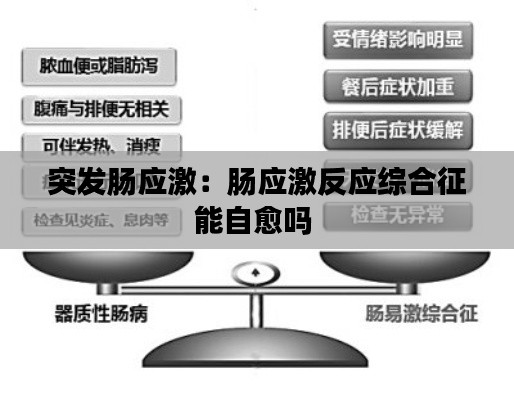<!DOCTYPE html>
Understanding Sudden Intestinal StressWhat is Sudden Intestinal Stress?
Sudden intestinal stress refers to a condition where the digestive system experiences an acute and often unexpected disturbance. This can manifest in a variety of symptoms and can be caused by a range of factors, including dietary changes, infection, medication, or even psychological stress. It's important to recognize the signs and understand the potential causes to manage and alleviate the symptoms effectively.
Common Symptoms
The symptoms of sudden intestinal stress can vary widely, but some of the most common include:
Abdominal pain or cramping
Diarrhea or loose stools
Bloating and gas
Loss of appetite
Nausea or vomiting
Excessive flatulence
These symptoms can range from mild to severe and may come on suddenly, making them particularly concerning for individuals who are not used to such discomfort.
Causes of Sudden Intestinal Stress
Sudden intestinal stress can be caused by a variety of factors, including:
Dietary factors: Eating a new food, consuming large amounts of fiber, or ingesting allergens can all trigger sudden intestinal stress.
Infection: Bacterial, viral, or parasitic infections can cause inflammation and disrupt normal digestive function.
Medications: Certain medications, such as antibiotics, anti-inflammatory drugs, and chemotherapy, can alter the balance of bacteria in the gut and lead to intestinal stress.
Psychological stress: High levels of stress can affect the digestive system, leading to symptoms of sudden intestinal stress.
Lifestyle factors: Lack of sleep, excessive alcohol consumption, and smoking can contribute to intestinal stress.
Diagnosis and Treatment
Diagnosing sudden intestinal stress typically involves a combination of medical history, physical examination, and sometimes laboratory tests. A doctor may ask about recent dietary changes, medication use, and stress levels to help pinpoint the cause.
Treatment options will depend on the underlying cause. Some common treatments include:
Dietary adjustments: Avoiding trigger foods, eating smaller, more frequent meals, and staying hydrated can help manage symptoms.
Antibiotics or antiviral medications: In the case of an infection, these medications can help clear the infection and alleviate symptoms.
Antidiarrheal medications: For severe diarrhea, these medications can help slow the digestive process and reduce the frequency of bowel movements.
Stress management techniques: Techniques such as meditation, deep breathing exercises, and counseling can help manage psychological stress and its impact on the digestive system.
In some cases, further testing or referral to a specialist may be necessary to address complex or chronic cases of intestinal stress.
Prevention and Long-term Management
Preventing sudden intestinal stress involves a combination of lifestyle changes and being mindful of dietary and health habits:
Gradually introduce new foods into your diet to avoid sudden reactions.
Maintain a balanced diet rich in fiber but avoid overeating fiber-rich foods, especially if you have a sensitive digestive system.
Stay hydrated by drinking plenty of water throughout the day.
Avoid known allergens and trigger foods.
Manage stress through exercise, relaxation techniques, and sufficient sleep.
Regularly review medication use with a healthcare provider to ensure it is not contributing to intestinal stress.
For those who experience frequent episodes
转载请注明来自北京维邻康大药房有限责任公司,本文标题:《突发肠应激:肠应激反应综合征能自愈吗 》











 蜀ICP备2022005971号-1
蜀ICP备2022005971号-1
还没有评论,来说两句吧...